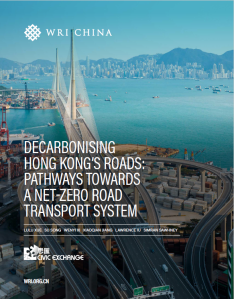Decarbonising Hong Kong’s Roads: Pathways Towards a Net-Zero Road Transport System
This report proposes a roadmap for zero emissions for Hong Kong's road transport sector, focusing on the bus, private car and freight vehicle segments.
The transport sector is the second-largest greenhouse gas (GHG) emission source in Hong Kong after the power sector, and road transport is the largest source of transport emissions. Decarbonising road transport is important for realising the city’s net-zero emission goal. This report focuses on the top road transport emitters—private cars, freight vehicles, and buses.
Zero-emission transition of franchised buses: More than e-bus trials
It is crucial to foster Hong Kong’s franchised bus electrification without compromising high operational efficiency, passenger comfort, and market competitiveness. Due to high vehicle prices and costly infrastructure investments, the total cost of ownership (TCO) cost parity between diesel double-deckers and electric double-deckers is not yet achieved in 2021. In the future, with lower vehicle prices and improved vehicle energy efficiency, TCO cost parity may be reached in (or before) 2030. Based on possible TCO parity timeliness as well as the measures taken by various stakeholders, the study proposes three possible “diesel bus ban” time lines: 2026, 2030, and 2033. The socioenvironmental impact analysis shows that to balance public financial viability and environmental, social, and health benefits, banning new registration of diesel buses around 2030–2033 is viable for Hong Kong. To this end, Hong Kong needs dedicated zero-emission bus trials, a long-term electrification roadmap, and sustainable policy safeguards—including vehicle purchase subsidies, public supports on charging infrastructure delivery and hydrogen supply, and plans on grid-friendly vehicle integration.
Private car electrification:“Shift“ policies (from private cars to green transport modes) are essential
Hong Kong is more proactive with private car (PC) electrification: it is the city’s aspiration to prohibit new registration of internal combustion engine (ICE) private cars by 2035 or earlier. Unlike global front-runners in EV promotion, Hong Kong has the potential of creating a new electrification paradigm by enhancing its vehicle electrification ambition, while controlling overall car ownership and usage.
Because of the high fuel prices in Hong Kong and generous tax concessions for electric PCs, compact cars and replaced EVs in Hong Kong achieved cost parity in 2021. With continued tax concessions, the TCO parity of new electric SUVs is also rapidly approaching (before 2024). Hong Kong has room to further advance the time line of the ICE vehicle ban on PCs from 2035 to 2028.
In the near term, tax breaks should be gradually phased out, to offset the continuous drop in EV prices and to avoid boosting car ownership. proactive TDM options could be considered by the city to manage car ownership as EV prices drop, including implementation of zero-emission zones, increased parking fees (or congestion charge), carbon pricing on fuels, and direct car ownership control.
Freight vehicles can be decarbonised
Hong Kong should prioritise electric trucks in all sizes, including a certain share of hydrogen fuel cell heavy goods vehicles. Hong Kong should ban new registration of internal combustion engine (ICE) light-goods vehicles by 2030, and ICE medium- and heavy-goods vehicles by 2039. To achieve this goal, financing the expansion of public charging/alternative fuel–refuelling network is needed, and this could be from government subsidies, public-private partnerships (PPPs), or leveraged capital from the private sector such as green loans and bonds from financial organisations.
Projects

Sustainable Mobility
Visit ProjectSustainable Mobility Project aims to contribute to the development of low-carbon transportation in China, and build a green, efficient, inclusive and resilient urban mobility system.
Part of Sustainable Cities
Low-carbon transport
Visit ProjectWe work with national and local partners to develop medium- and long-term transport decarbonization roadmaps, formulate near-term key emission-reduction solutions, and facilitate global knowledge sharing, to achieve the low-carbon transition of China’s transport sector while ensuring social equit
Part of Sustainable Cities

